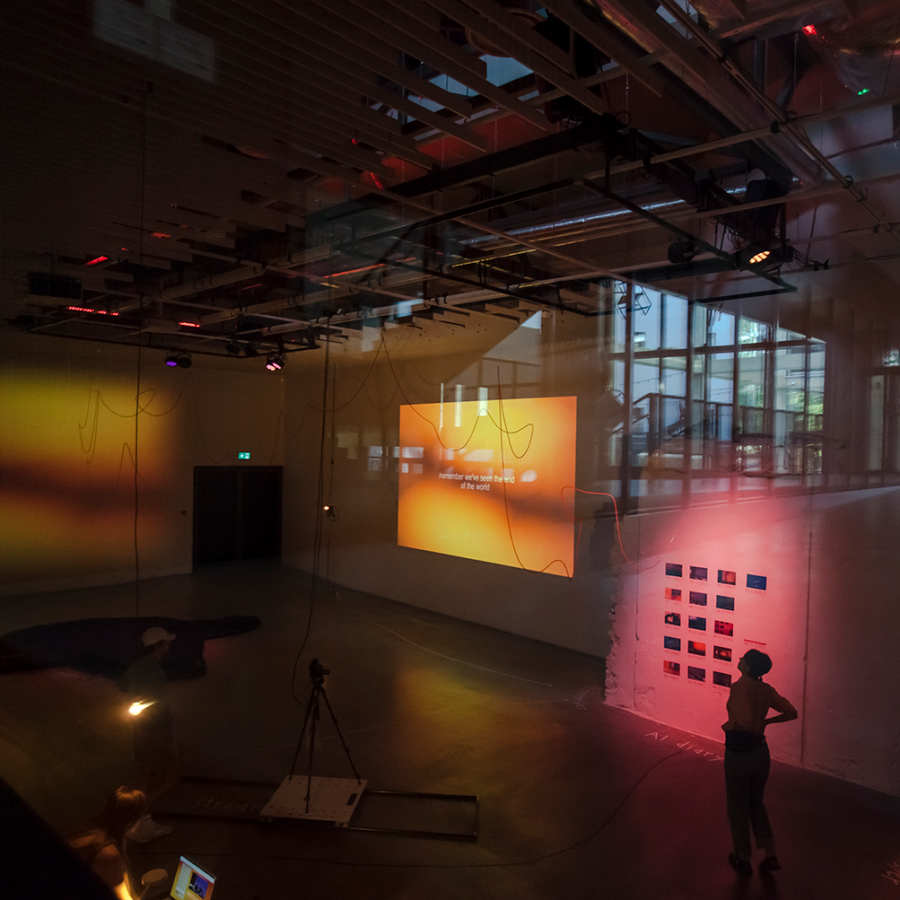
Photo: Alana Proosa
20.10.2023
Start Time:
11:00
End Date:
20.10.2023
On 20 October at 11.00 4th-year Art and Design PhD student Taavet Jansen will present his third doctoral project „Held in Human”.
Reviewers: Dr. Raivo Kelomees and Andrus Laansalu
Supervisor: Dr. Anu Allas
Public peer-review event will take place in the Zoom, please find the link to participate HERE (Meeting ID: 928 1284 1579, Passcode: 964549).
The event is held in Estonian.
“You enter the exhibition hall like a body cave, the actions only express treachery. One searches for a singular and all-determining meaning from within. No one wants to be dead, but one wants to touch the brain from the inside. Beauty no longer counts. Pain is not taken into account; the precision of repetition decides everything.”
Ene Mihkelson “Ahasveeruse uni” pg 110
“Held in Human” was a staged installation / durational performance that premiered during the SAAL Biennial festival on August 21st and lasted until September 13th, 2023, at the EKA Gallery in Tallinn and on the website human.elektron.art.
The artists aimed to create an environment where a person would feel safe and warm, like in a mother’s womb. They explored how to evoke this feeling using the “bare” gallery space and theater technical means. The artists’ desire was to foreground contemporary “intestines” and “vasculature” (web space, cables) that keep and nourish us in life, and connect us to each other. Thus, a “safety bubble” was created in the physical space where sound and lighting design, video installations, objects, and the augmented reality layer allowed spectators to spend time, find connections between different parts of the work, and co-create and perform its dramaturgy.
“Held in Human” allowed the audience to visit the physical space via a website, send messages there, and seek contact with visitors present. A visitor in the physical space could simultaneously be a mediator, an experiencer, or an online viewer. In this way, one could present imaginative images, memories, and thoughts to each other, give a voice to those far away, and be heard yourself. All world languages could be used. All messages entered on the website were saved in an augmented reality layer; everything whispered was recorded. The gallery had a live camera, which every visitor could access freely. At the end of each day, the artists asked the artificial intelligence to summarize all the messages in haiku form, combined with a single shot captured from the live camera – thus creating a collective diary of the time and people who participated and shaped this work. Additionally, the audience could stay updated via a WhatsApp group.
As much as the finished artwork, “Held in Human” embodied a concept, a model to be explored and played out with the audience. The artists spent 21 days in residence, parallelly with the audience and the artwork, observing people’s behavior and reactions and placing themselves in the audience’s role. The process was also followed and interpreted by two young actors. During the exhibition period, four performative special events took place – all to explore the potential future of such hybrid spaces.
Why is this important?
Jeanette Winterson writes in her book “12 Bytes” that we’ve reached a time where, due to digital technology and the web, the meaning of being human has changed. She writes: “… the uniting link between the operations of matter and abstract mental processes is to reimagine – completely – what we call ‘real.’ This reimagined ‘real’ will soon be what we call the world.”
Technological device connected to the digital network acts as an extra limb for humans, helping them to touch and perceive the world. The reality of the modern human is still perceived through the physical body. Yet, one is also constantly online and connected to every other body in the world, whose extension of reality is a screen or smart device.
The authors have devoted the last five years of their creation to reimagining and playing out this new “real”. They believe that art should keep pace with societal progress and be the field that shows the way to incorporate technology into our lives meaningfully. Instead of focusing on what we have lost, Taavet Jansen and Liis Vares are interested in what we have to gain in the future.
Authors, directors: Taavet Jansen, Liis Vares
Light designer: Jari Matsi
Sound and video designer: Taavet Jansen
Dramaturgs, choreographers: Liis Vares and AI
Performers: Germo Toonikus and Liisbeth Kala
Software developer and web designer: Kristjan Jansen
Producer: Kati Saarits
Photos: Alana Proosa, Xenia Kvitko
Co-producers: EKA, e⁻lektron
